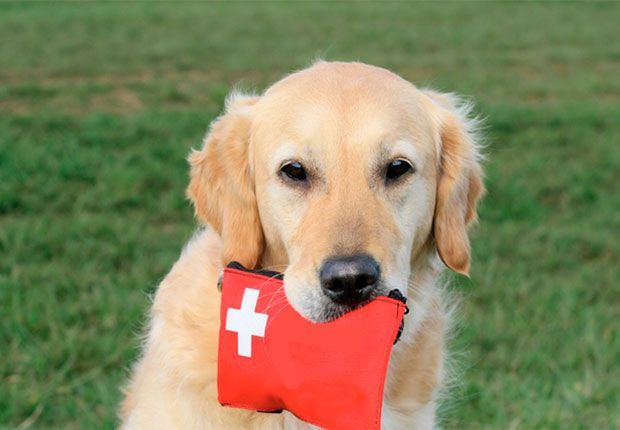
First aid kit for dogs

Having got a dog, there is also a need for preparations and tools in case of emergency, or simply to treat injuries. In this case, in every house where there is a dog, there should be a first aid kit.
Contents
First aid kit for dogs
How to complete the first aid kit so that everything you need is at hand?
Treatment of wounds, scratches, cuts, dressings
- Chlorhexidine or Miramistin are suitable for the painless treatment of external lesions, as well as mucous membranes.
- Hydrogen peroxide 3% – for the treatment of shallow lesions, clipped excessive claws.
- Saline solution in sterile packaging – for washing wounds and cuts, treating mucous membranes.
- Hemostatic sponge or hemostatic powder.
- Levomekol ointment is an antibiotic-containing ointment. Other options are Baneocin, Bepanthen, Dexpanthenol, Ranosan powder and ointment.
- Gauze sterile wipes and dressings-bandages, cotton pads and sticks.
- Bandage tape, silk or paper, holds well, but does not adhere as strongly to the coat and can be removed without pulling out the coat.
- Adhesive bandage or mesh bandage to secure and protect dressings.
For disorders of the gastrointestinal tract and poisoning
- Sorbents – activated carbon, Enterosgel, Smecta, Polysorb.
- Phosphalugel – sorbent, enveloping.
- Probiotics – Viyo, Vetom, Bifidumbacterin to restore digestion.
- Vaseline oil for constipation.
- Antiemetic – Cerucal.
- Vitamin B6, with isoniazid poisoning, Vitamin K – with rodenticide poisoning, in ampoules. Emergency funds will help the dog survive to the veterinarian.
Medicines that relieve pain
- No-shpa is an antispasmodic, to alleviate the condition with spasms of the intestines and urinary tract. Most often in ampoules.
- Rimadyl – after operations, injuries, diseases of the musculoskeletal system to eliminate pain and relieve inflammation. It has enough contraindications and side effects.
A veterinarian should be consulted before using pain medication. ! Some drugs – paracetamol, aspirin, diclofenac, ketorolac, ibuprofen, naproxen are strictly prohibited for dogs, they pose a danger to health and life. !
Antiallergic drugs
- Suprastin in ampoules. The dosage must be exactly followed.
- Cetirizine (Cetrin, Zyrtec) tablets
- Prednisolone, Dexamethasone – more commonly used for snake bites.
Sedatives
- Fiteks, Kot Bayun – herbal preparations, have a mild sedative effect.
- Stop stress, with severe stress, is applied for a short time.
Hygiene products for prevention
- Ear cleaning lotion
- Lotion for rubbing eyes
- Toothpaste (gel, spray)
- Paw wax (and cream, if needed)
- Preparations for external and internal parasites
Tools
- Scissors with rounded tips. With their help, you can cut both the hair between the fingers and around the wound without fear of injuring the dog.
- Tweezers are anatomical (medical). It will help with the extraction of splinters and the treatment of minor injuries.
- Elizabethan collar. Will not let the dog reach out and lick the damage.
- Neoprene or other boot, for walking outdoors, when the paw pad and bandage protection are cut.
- Electronic thermometer with flexible tip. For measuring temperature rectally.
- Syringes in several sizes.
- Tick twister.
- Cold pack. To help with bruises.
- Syringe.
- Tablet-giver (introducer). If the dog does not want to swallow the tablets.
- Pipette.
- Flashlight with bright directional light. Allows you to carefully examine the damage to the dog, including the ears and mouth.
- Absorbent diapers.
- Gloves.
The list can be replenished depending on the appointments of the veterinarian and chronic diseases of the animal. The main thing is not to harm the pet, even through ignorance or negligence. An insufficient dose of the drug will not work, and an overdose, as well as attempts to self-diagnose and treat, are fraught with complications and even death of the animal. If the medicine is stored incorrectly or expired, it may be ineffective, and sometimes cause severe allergic reactions or poisoning. Ignorance of the method of using medicinal solutions, an incorrectly made injection or dropper will lead to unpleasant consequences. For example, administering intramuscular or intravenous drugs subcutaneously can lead to tissue inflammation at the injection site. You can always ask the veterinarian to show and tell you how to use these drugs correctly. Therefore, it is important to properly store the drugs in your first aid kit, regularly check their expiration dates and follow the instructions of the veterinarian. Visiting the veterinary clinic twice a year for a routine check-up will help determine the health status of your pet and identify possible problems at an early stage.





